Learning @ Scale 2020: Conference Highlights
This year, the ACM conference went online to discuss the many forms of at-scale education worldwide.
A few weeks ago, the eighth edition of the ACM conference Learning @ Scale took place. The conference is dedicated to all forms of education where instruction is augmented through technology for delivery to a large number of learners — most notably, via the internet.
The event was initially supposed to take place at Georgia Tech in Atlanta, USA, back in May. But due to COVID-19, it was postponed and moved online, like many other conferences.
With the move online came increased accessibility. And with the pandemic came increased interest, since many institutions are currently transitioning online. As a result, the event saw its largest, most global audience to date: 280 attendees from 26 countries worldwide.
Conference Program
The conference program spanned three days. It started with a keynote on interest-driven learning and ended with a fireside chat on at-scale learning ethics. The bulk of the program consisted of:
- 8 workshops — one co-organized by Class Central.
- 20 research and synthesis papers — the meat of the conference.
- 64 work-in-progress, demos, and a late addition, COVID-19 case studies.
All the submissions are openly accessible. Let’s highlight some of the papers presented.
Paper: Scaling Human Learning Globally
In the paper Co-Teaching Computer Science Across Borders, Stanford Professor Chris Piech and his co-authors explain how they teach large groups in person while retaining the benefits of smaller groups, and how they expanded this idea to co-teach a course globally.
MOOCs have contributed to the democratization of learning. But the MOOC learning experience leaves something to be desired. For one, it’s not very social. And perhaps partly because of that, MOOCs don’t always succeed to the level we’d expect.
“What would it look like if we got the sort of scale you get with MOOCs but mixed it with the human experience we all live and love when teaching and learning [in person]?” asks Chris in his presentation. “This idea […] has been the secret sauce over at Stanford.”
The approach involves dividing large classrooms into small groups each led by a student TA. This way, the classroom as a whole may benefit from the instructor’s teaching. But individual students may also benefit from the social interactions afforded by their learners group.
And this idea scales globally. To do so, Chris and his team put together a course kit to teach computer science basics using this social approach. In addition, they developed a model for sharing teaching know-how by co-instructing the course in person in universities worldwide.
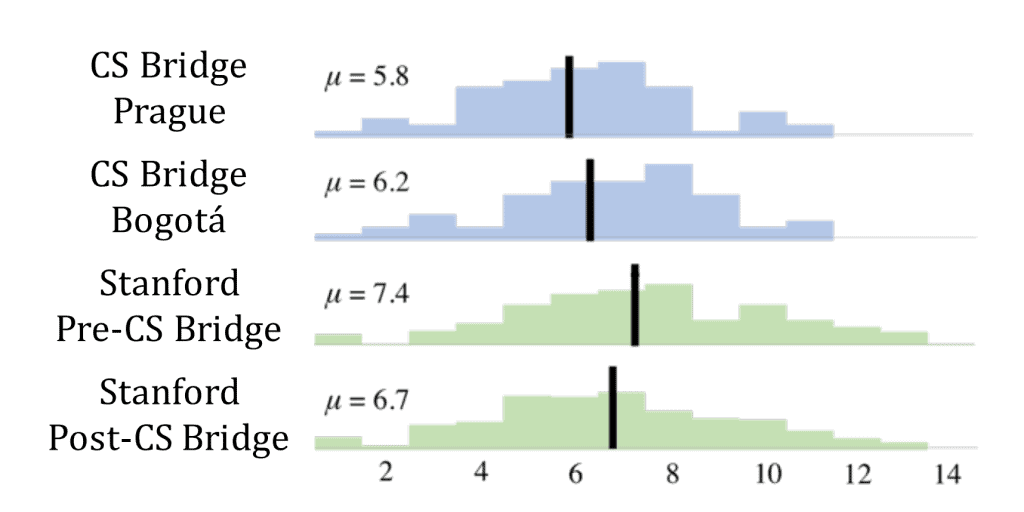
This crossborder approach raised a number of challenges:
- How to deal with infrastructure limitations, such as the lack of reliable internet?
- How to ensure teaching would be culturally relevant to local learners?
- How to extend the approach to non-university contexts?
These questions are all addressed in Chris’ paper, which is available here.
Paper: Sensing Students’ Emotions to Improve Learning
In the paper Sensing Affect to Empower Students, Georgia Tech PhD student Qiaosi Wang and her co-authors explore students’ views on how technology may be used to sense learners’ emotions, and how said emotions may in turn be used to improve at-scale learning.
Imagine you’re teaching in a small classroom. You can immediately see students’ emotions: whether they’re bored, whether they’re confused, whether they’re excited. And you can react accordingly. If students seem confused, you can try to re-explain things more clearly.
“However, in large-scale educational contexts [large classrooms or online], this emotional feedback is completely lost,” explains Qiaosi in her presentation. “So there’s no way for you to detect students’ emotions or provide timely interventions.”
Technology can help address this problem. Cameras or smart wristwatches can be used to sense students’ emotions at scale. And the data can be used to improve learning. If a video lesson causes much confusion, perhaps it’s due for a refresh.
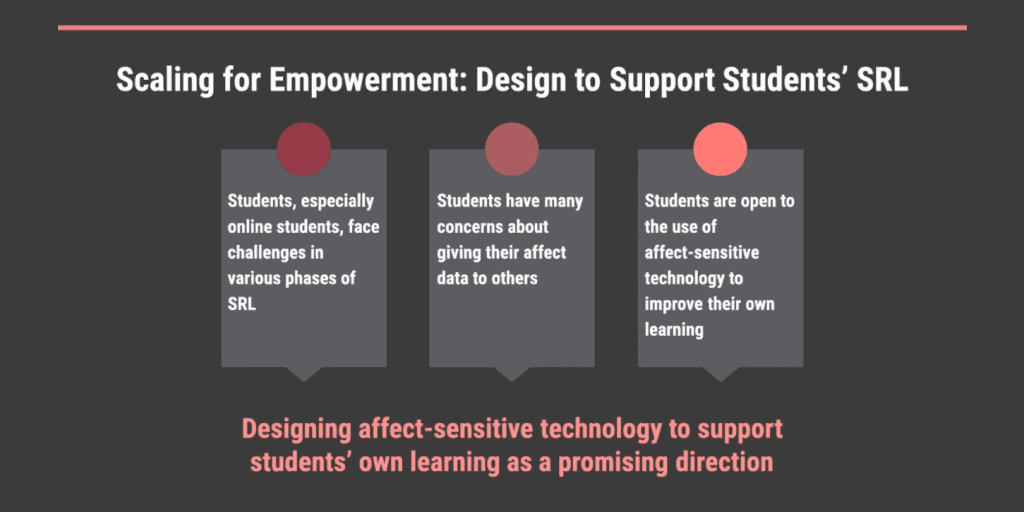
But this technology also raises questions:
- What concerns do students have regarding the collection of their affect data?
- How can students use their affect data to support their learning?
- What type of affect sensor would students prefer?
These questions are at the heart of Qiaosi’s paper, which is available here.
The two papers above respectively received the conference best paper award and best student paper award. Besides papers, the conference included workshops. Let’s talk about one.
Workshop: Discussing At-Scale Learning Worldwide
The workshop Global Learning @ Scale — co-organized by Georgia Tech’s Dr. David Joyner; Tokyo Tech, Galileo University, and HPI researchers; and Class Central — aimed to shine a light on large-scale learning initiatives around the globe.
While paper sessions focused on hard research, this workshop was an opportunity for more casual conversation on a topic often overlooked: at-scale learning isn’t bound to any specific country; it’s occurring worldwide — sometimes in peculiar and interesting ways.
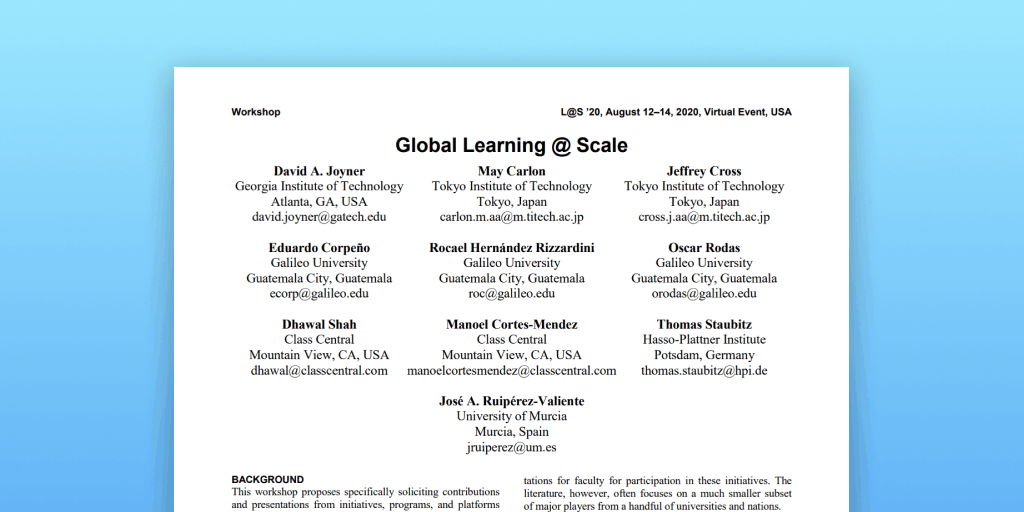
For instance, Dr. Joyner talked about Georgia Tech’s online master’s degrees and some of their latest developments, such as online students meeting in person in Shenzhen, China, to receive face-to-face instructions, thereby reclaiming some of the social aspects of the on-campus experience that are hard to translate online.
Dr. Jeffrey Cross and PhD student May Kristine Carlon talked about the key role mentorships play in the Japanese society, where a kōhai (mentee) learns from a senpai (mentor) — an educational pattern that permeates all facets of Japan’s culture, academia, and industry.
And I talked about SWAYAM, India’s national MOOC platform, building on Class Central’s coverage of the platform and expanding on the paper we presented last year at Learning with MOOCs. I also talked about India’s new generation of online degrees and new education policy.
In the second part of the workshop, attendees were divided into groups to discuss topics inspired by the talks. In our group, Dr. Thomas Staubitz talked about the challenges of credit transfer across European institutions. And Dr. Rocael Hernández talked about the usage of online proctoring in Galileo University’s online degrees.
I believe there’s a strong appetite for these sorts of discussions centered around large-scale, but often little-known, global learning initiatives, their peculiarities, and their growth. Global Learning @ Scale seems to be the ideal venue to satiate this appetite in the years to come.
Learning @ Scale 2021
Barring any setbacks, next year, Learning @ Scale should be hosted at the Hasso Plattner Institut in Potsdam, Germany. The event will take place alongside EMOOCs, the biennial European MOOC conference, in which Class Central participated in 2019. We hope the event retains some of the accessibility gained this year. And we hope to see many of you there.
Tags

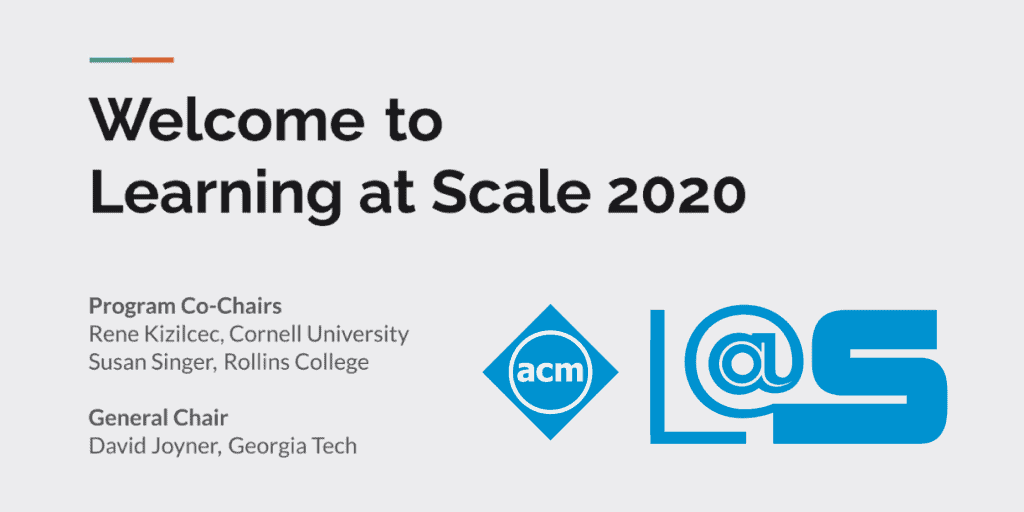
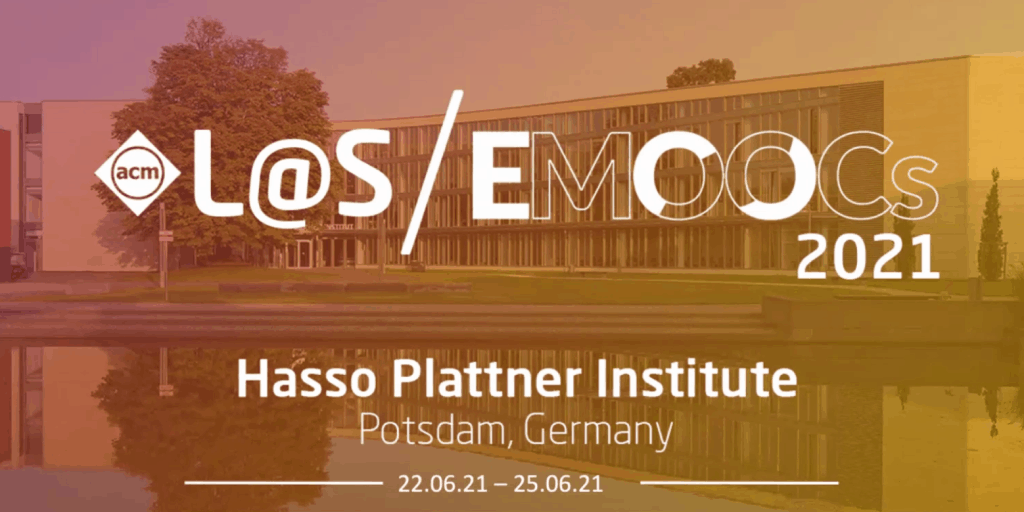






ERIC Hrahsel
Impressive. I am looking forward to how eLearning changes in the scientific biology field as well.